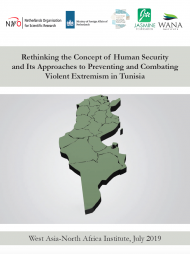-
Rethinking the Concept of Human Security and Its ...
Rethinking the Concept of Human Security and Its Approaches to Preventing and Combating Violent Extremism in Tunisia
This country report reflects an examination of the data collected in Tunisia over 12-months. Initially, it grapples with some definitional issues pertaining to human security, outlining how the concept is well-present at the perception level, but absent at the procedural knowledge level. It also extends the definitional discussion to include violent extremism and state-centric security policies; providing a critical assessment of their definition, outlook, impact, and eventually their link to human security. Further, the report offers practical recommendations to enhance 11 pillars of human security within the Tunisian context, before offering a reconceptualisation of human security towards more dynamic and interactive human security approaches. The six communities examined across Tunisia are: Djerba, Ben Guerdene, Carthage, Douar Hicher, Menzel Bourguiba and Teboursouk.
This report is part of the regional project “Towards More Effective Human Security Approaches in the Context of the Emerging Threat of Violent Extremism in Jordan, Lebanon, and Tunisia”. Findings from the four briefs previously published on Jordan, and two on Lebanon, as well as forthcoming ones on Tunisia will feed into analytical research papers, which will be published later this year. Over the coming months, the WANA Institute will publish the remaining policy briefs on the fieldwork conducted in Tunisia, in addition to two papers: A Theory of Change and a White Policy Paper.

